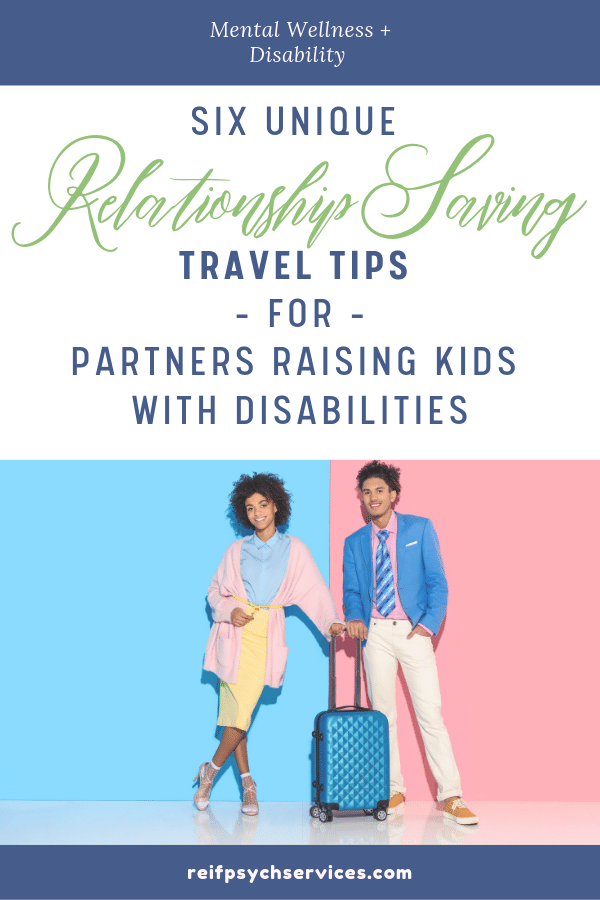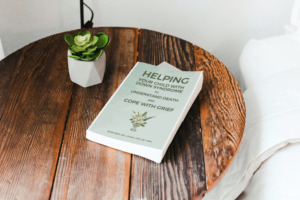Traveling is stressful. Marriage can be stressful. Raising a child with disabilities is stressful.
Trying to be successful at all 3 of these stressful things at the same time? That can leave parents feeling like they’ve failed.
In my counseling practice, I offer therapy for parents raising kids with disabilities. As summer travel season arrives, my clients often share similar travel horror stories.
Despite meticulous planning, the happy family vacation that they’d envisioned quickly disintegrated into a disaster. Their child had a meltdown, which maybe felt inevitable. Parents raising kids with disabilities know that transitions and new expectations and new sensory stimuli can cause big feelings for little people.
But what the parents weren’t prepared for was how this affected their relationship with their partner.
My clients will come to session and say in bewilderment “I don’t know what happened. We’re usually so good at tag-teaming. We manage transitions and meltdowns at home with no problem. But on the trip, we were grumpy with each other. We nagged and fussed and sulked at each other. I felt totally unappreciated by my husband. And I’m sure that I didn’t make him feel any better.”
If you’re planning travel with your partner and your special needs child, you may fear that it will strain your relationship.
Read on to learn my six favorite travel tips for parents raising kids with disabilities. My hope is that these tips will help you keep a strong connection to their partner despite the stress that comes from traveling with a child with special needs.

1. Be explicit in stating your wants and needs before the trip
We all grew up with different family vacation experiences. You and your partner may have different assumptions about how or when things will happen when you’re away from home.
I’ve often worked with couples who’ve had major disagreements because of differing vacation expectations.
Like one couple who returned from a trip to Italy furious with each other.
For one partner, vacation meant a chance to sleep in and take things slowly. But the other partner wanted to wake up and start sightseeing early in the day to make the most of their time in Europe.
Neither partner’s view was wrong. But because they hadn’t realized their perspectives were different before they went, they didn’t hash out a compromise until after they were upset with each other.
That’s why I suggest that you talk ahead of time about your expectations. This can save you from feeling frustrated that your vacation isn’t living up to your expectations.
This is especially important for ensuring that you’re on the same page with changes in your child’s routine.
For instance, some families maintain their at-home screen time limits and routines while they travel. Other families are more lax and are OK with increased screen time during vacations.
Whatever you choose, it’s important to talk about your expectations with your spouse well in advance of the trip. That way you don’t start the car ride or plane trip having to resolve your different views.
Other common sources of vacation frustration for parents with different views are:
- Bedtime
- Snacks and meals (how much, how often, how healthy, etc.)
- Clothes (must kids dress up for pictures or certain dinners?)
- Medications (can kids with ADHD take a medication break during a vacation if they choose to?)
- Hygiene (do showers need to happen every day?)
- Important/transition items (do you bring along your child’s favorite pillow and risk that it might be lost? Or do you leave it home where it’s safe and introduce a special ‘travel pillow’?)
2. Establish one priority for each day
I often like to share with my clients (and with you blog readers), research that supports or contextualizes the issues that parents raising kids with disabilities face. Unfortunately, this is one area where research is woefully behind in describing real people’s problems.
We all know that family travel can be stressful. But, there aren’t many research studies that describe why this might be, and what things families can do to relieve this stress. There are even fewer studies that describe the travel experiences of families impacted by disability.
But, the limited studies that are available support why parents feel it’s important to expose their kids with special needs to travel. This Korean study found that:
“Leisure travel seems to be perceived as beneficial for children in that it enables them to learn more about themselves and can be a learning tool for improved mental and physical health. This study also acknowledged that building children’s confidence is one of the ways to help children to re-evaluate themselves as a result of leisure travel since the confidence is associated with a sense of accomplishment of completing a trip.”
So, it makes sense why parents want their kids with disabilities to experience the benefits of travel.
The trouble is that, when you’re spending money and have limited time to experience a place, it can suddenly feel important to get it ALL right. To take the loveliest pictures, to see all the sights, do all the activities, eat all the food. To do all the things. If you don’t manage to squeeze everything in, it can feel like you’ve failed. Especially if you and your partner both had many things you wanted to accomplish that day.
Rather than set yourself up for this perceived failure, I encourage couples to set just one goal for each day. It might be:
- We’ll take a family photo in front of the LOVE sculpture if you’re heading to Philadelphia, or
- We’ll all share a Dole Whip if you’re visiting Walt Disney World
Then everything else that you manage to accomplish is just icing on the cake. You don’t have to feel like you wasted the day because you didn’t get 10 important things done. Instead, you can choose to see the day as a success because you accomplished the one most important thing.
3. Do something together even when you can’t be together
This is a strategy my husband stumbled upon when our two kids were very little. Waiting in airports and staying entertained on planes were particularly tough when they were 2 and 3 years old respectively. We found that they tolerated the waiting and sitting better if we gave each of them 1:1 attention than if we tried to do things as a family.
But, this left my husband and I with limited time together.
On a particularly long layover in Dallas, I was coloring with our daughter while my husband built LEGO figures a few tables down with our son. I made a sad face and waived at him when he caught my eye. A few minutes later, my husband walked over and handed me one of his wireless headphones and walked back away.
Curious, I put it in my ear, and chuckled as I realized that we were listening to one of our favorite podcasts together. I love that he figured out how to share something we loved even though we were both focused on a separate kiddo.
We still laugh when we remember what happened when there was an unexpected twist in the story we were listening to. Sitting 15 feet apart, we both went wide eyed and gasped audibly. Lots of other passengers at the gate, who didn’t realize we were together, were wondering what they had missed!
4. Itineraries are great. But don’t forget to map out your responsibilities, rest, and alone time!
When I do couples counseling with parents raising kids with disabilities, I often observe that one partner feels overworked and underappreciated. This parent often feels like childcare defaults to being their responsibility. Especially when you’re paying dearly for a vacation, it’s frustrating to feel like you’re just doing your everyday tasks in a different place.
The best strategy I’ve found for this is to map out ahead of time not just itinerary, but also which parent will ‘take the lead’ during different times of the day. Here’s an example.
Say you’re heading to Great Wolf Lodge with your family of four. You know that your older, taller, neurotypical child will want to ride the most intense water rides with your more adventurous partner. This will leave you responsible for supervising your younger, Autistic child, who may be prone to sensory overload inside the busy, loud water park.
You know that you’ll be with your younger child during the hours you visit the water park. It might make sense to plan that your partner will be responsible for this child’s morning routine and breakfast, and that they’ll plan to take over again at dinnertime and oversee through bedtime.
I also strongly suggest that you build LOTS of rest time into your travel itinerary. Remember, you can always deviate from your plan if in the moment you see that your child doesn’t need such frequent rest. But, if they do need it, you’ll be glad that you’ve accounted for this in your planning.
Similarly, I often suggest that parents include alone time for each of them in their planning. For instance, one parent could agree to take both kids to the arcade room while the other parent has 30 minutes to spend how they wish. Then you can swap for the other parent to get 30 minutes to themselves.
5. Knowing that travel is a taxing time, amplify your efforts to show your spouse signs of love
But, because travel is stressful for you, too, make those plans before you go.
For instance, if your partner loves accessories, you could pick up a new bracelet or straw hat before you leave for your cruise. Then, when the moment is right, you have a little token to give her that shows you care. But you didn’t have to deviate from your vacation plans or stress about finding the right item away from home.
Or, if your partner swoons when you give them compliments, set reminders in your phone to give them random compliments throughout your time away from home.
Staying mindful and intentional about showing your partner that you’re thinking of them can do wonders to resolve some of the tension that travel can bring.
6. Create a vacation ritual that’s just for you and your partner
Even the smallest of rituals can help parents raising kids with disabilities who feel like they’re living from crisis to crisis. I love encouraging couples raising kids with special needs to create a vacation ritual that’s just for them.
For instance, maybe you’re take an annual trip to the beach with other family members. You and your partner may make a ritual of walking along the shore to the pier every day after lunch.
You can still create meaningful rituals even if you don’t have other family members with you to provide childcare. It could be as simple as saying “Cheers to us” and clinking your glasses of orange juice every morning at breakfast.
These rituals needn’t be something elaborate.
The point is that they are something small but sacred that you and your partner alone share. They signify your commitment to each other and to your children. Rituals provide small opportunities throughout the day to reflect on what you love about each other.













